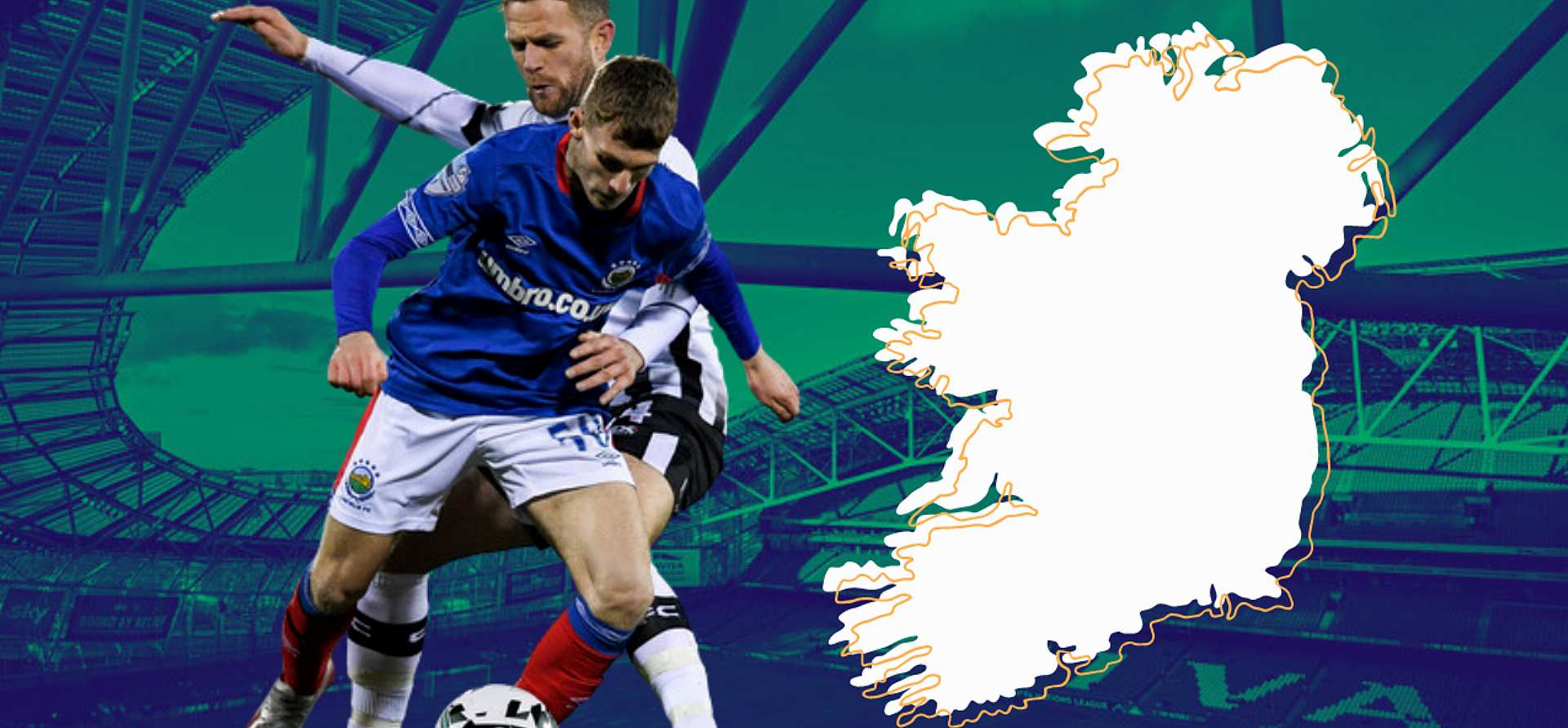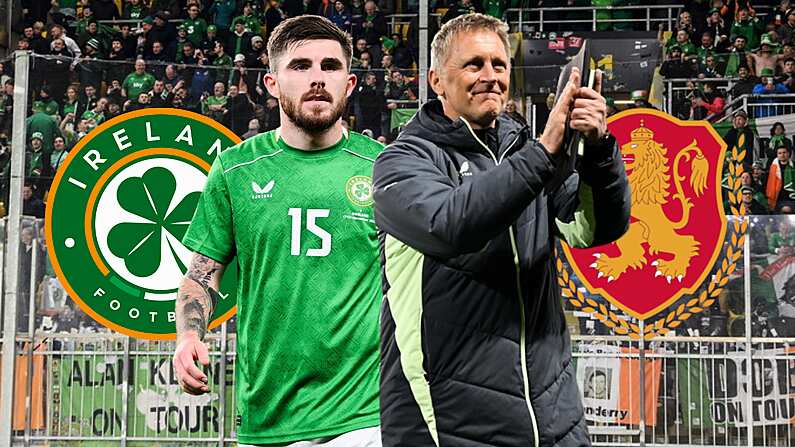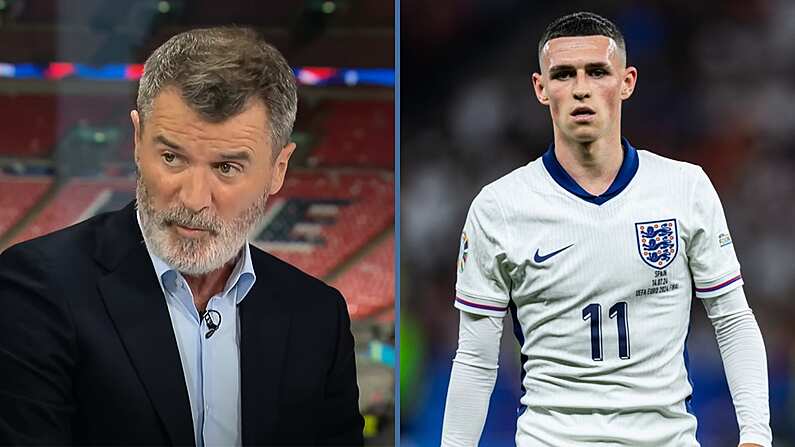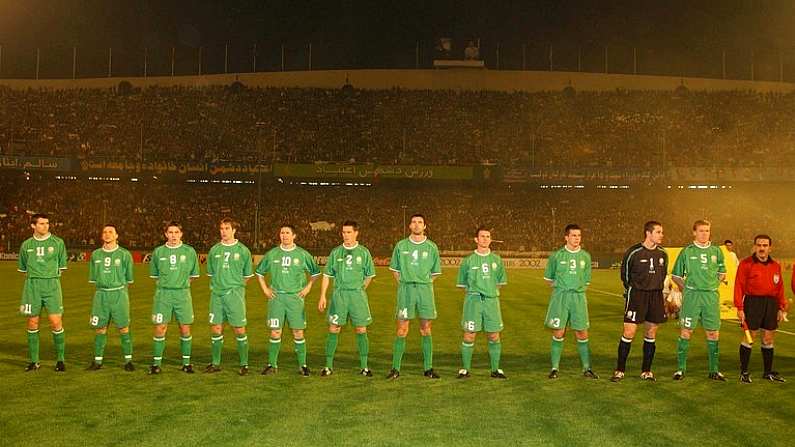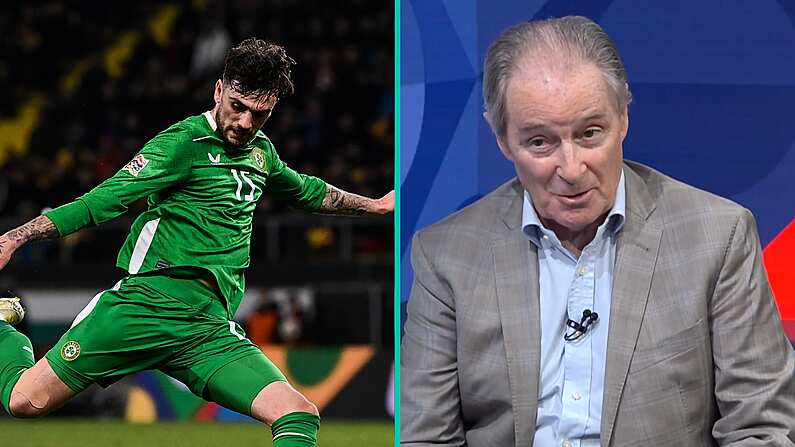On Thursday night at Windsor Park, Larne will play host to Shamrock Rovers in the UEFA Conference League, in an enticing clash of the Irish champions in Europe. In an alternate universe, that could have been a regular affair.
Many hours have been spent dreaming up an all-island league. The obstacles are many and obvious. It remains an essential step in the development of football on either side of the border.
Few people have done more thinking on how the logistics of an All-Island league could work than Dutchman Pim Klaver
Klaver - a former cyclist - is a consultant and project manager with Dutch data company Hypercube. His firm have worked extensively with FIFA and UEFA, and are behind the new Champions League format.
When we spoke, he had just finished creating the match schedule for the 2026 FIFA World Cup - a task he told us was a challenge, with the expansion to 48 teams and the resulting change in format creating as many as 495 potential combinations of teams in the knockout stages.
When Klaver arrived at Hypercube in 2019, the first project he was assigned to was the All-Island League, which was the brainchild of businessman Kieran Lucid. Klaver tells us that Hypercube joined the project some way into Lucid's process, and immediately proposed a shake-up in format.
The project was much publicised at the time, with support from clubs and fans on both sides of the border slowly growing as the proposed format became clear. The format cleverly allowed both leagues to maintain their own standings (crucial to remaining within UEFA rules for European qualification), effectively allowing both the traditional League of Ireland and Irish Premiership champions to be crowned, while also introducing a champion of the 'All-Island league.'
However, the plan never got the green light. The COVID pandemic wrought havoc on planning, and, crucially, certain parties north of the border could not be swayed to bring it in.
However, the idea remains hugely attractive and worth revisiting.
Pim Klaver explains that the potential benefits of an All-Island League were not only real but could be instantly attained by both associations.
He says external bodies such as TV broadcasters were hugely excited by the proposals, with the potential for a big influx in funding for clubs on both sides of the border. The knock-on effect of such a reinvigoration of the league format would not be long in forthcoming, he argues.
I think the great benefit of this would also be to get all parties engaged who are at the moment not involved or not involved that much within your football. So, for example, we know that the infrastructure of the Irish stadiums is pretty bad. But we think that such an initiative which is so big of a change has a good opportunity to start talks with the government to start a project to get better stadiums in and to improve the standings of the stadiums, for example.
We think that changing your format and going into a cross-border football can bring you something.
We knew, for example, those TV broadcasters, that they were very interested in broadcasting these cross-border stages. If you can engage them within the design process of the format and in the design process of getting such a competition up and running, you can get funds that are unimaginable nowadays for Irish football.
UEFA have encouraged the possibility of cross-border competitions in Europe in the past. In 2012, the UEFA Executive Committee met in Istanbul, and put on offer to "interested associations upon request to study supra-national possibilities."
The island of Ireland is not the only area to have explored this possibility. In the early 2020s, talks were ongoing between the Belgian and Dutch leagues to form a cross-border league ("BeNeLiga"). Discussions went as far as consulting with UEFA president Aleksander Ceferin around the time of the Super Cup in Budapest in 2020 and again in early 2022.
Those talks stalled due to a push from UEFA to get the new Champions League format over the line - but the door remains open for a 'supranational' league in Europe.
READ HERE: "He's Been Rugby Tackled To The Ground": Duff Tries To Make Sense Of St Pats Thriller
READ HERE: Martin Keown Points Finger At Old Enemy For Role In Manchester United Rout
Hypercube analyst explains why an All-Island Irish league can still work
The doomed 'Unite the Union Cup' was the latest attempt to establish a cross-border competition in Ireland but only ran for one edition in 2019 before collapsing partly as a result of the COVID-19 pandemic.
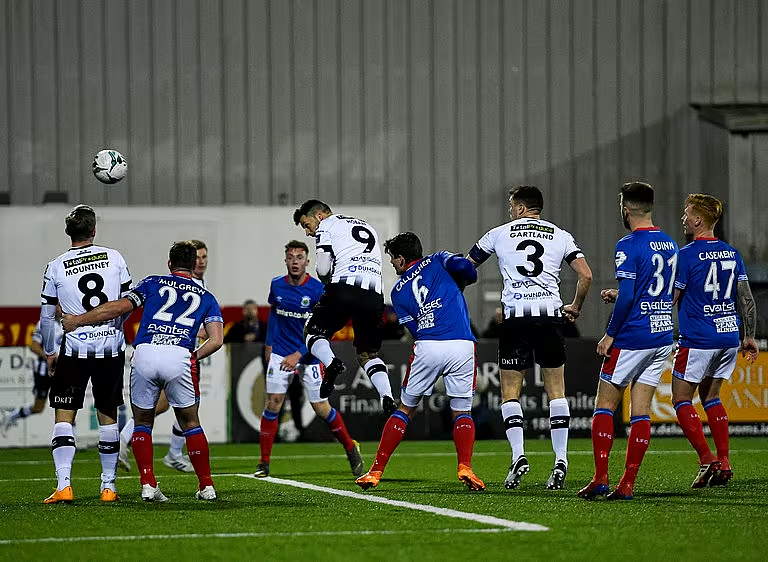
11 November 2019; Patrick Hoban of Dundalk scores his side's sixth goal during the Unite the Union Champions Cup Second Leg match between Dundalk and Linfield at Oriel Park in Dundalk, Louth. Photo by Eóin Noonan/Sportsfile
In the months leading up to that clash between Dundalk and Linfield, Hypercube and Kieran Lucid's work had been ongoing behind the scenes attempting to unite the League of Ireland and Northern Ireland Football League.
It's clear from speaking to Pim Klaver that he and the company not only held a passion for the concept of a combined Irish league but believe that it could still be achieved.
Klaver says that the drive for the All-Island League was largely down to the energy of Kieran Lucid, and stresses that Lucid and his group of collaborators (which included Irish football legend Brian Kerr) deserve immense credit for pushing the conversation forward.
Gradually, Lucid invited in further collaborators, which is when Hypercube came. Having slowly built support through some tireless campaigning, Lucid's group enlisted Hypercube to come up with a format for the tournament - one of Klaver's first tasks working for the company.
This is the vision for the cross-border league that Klaver devised.
"One of the most important requirements [from UEFA] there is that there should be domestic standings at the end of the year via which the European tickets can be distributed," Klaver explains.
So there's no such way that the Irish and Northern Irish can play together and the first three get the tickets out of the bowl.
So, therefore, we came up with the idea that the first stage [rounds of games] would be played domestically then the top eight out of Ireland and the top six from Northern Ireland go into the cross-border stage. That leaves you with 14 teams in the cross border states and there everyone plays each other once.
It's a single round of 13 matches and out of those 13 matches, you have like these cross-border league standings by which you will end up in the knockout stage. But the 13 matches also counts for the domestic part.
It's a subtly complex but ingenious system, which would have maintained the sanctity of both leagues while allowing for the introduction of an exciting, cross-border competition.
Klaver believes that this is the future of league football in "small- to mid-sized countries," seeing it as a way in which those nations can tighten the gap between them and the powerhouses of European football.

10 July 2019; Conor Gallagher of Chelsea in action against Robbie McCourt of Bohemians during a friendly match between Bohemians and Chelsea at Dalymount Park in Dublin. Photo by Ramsey Cardy/Sportsfile
Enthusiasm was high at the time. 12 clubs south of the border and 10 north were consulted on the proposals, with 20 of the 22 signing letters to the IFA and FAI encouraging them to pursue the exciting new competition. However, the project stalled when the IFA effectively pulled the plug in October 2019, citing issues over the "highly speculative proposals" from Kieran Lucid's team.
Having listened to the proposals from Mr Lucid and his team, we believe the best interests of our member clubs and football in Northern Ireland are better served by remaining with the club-led model established in 2013 via the Northern Ireland Football League.
UEFA competition places, prize monies and youth solidarity funding are important to our clubs and we do not wish to put these in question.
We greatly value our association and club links with the Football Association of Ireland and are happy to both take part in, and enhance, cross-border cup competitions at all levels.
Klaver also points out that several countries elsewhere in Europe are currently exploring a similar setup. When the BeNeLiga was being explored in the early 2020s, those involved said that they were aware of several regions that would be perfectly suited to multinational leagues, referencing the island of Ireland as well as the Scandinavian countries.
So, five years on, is the All-Island League still achievable?
For Pim Klaver, it is not only achievable but a highly attractive course of action for both federations and sets of clubs to follow.

3 November 2023; Ronan Finn of Shamrock Rovers celebrates with the SSE Airtricity League Premier Division trophy after the SSE Airtricity Men's Premier Division match between Shamrock Rovers and Sligo Rovers at Tallaght Stadium in Dublin. Photo by Stephen McCarthy/Sportsfile
The Dutchman is brutally honest about the relevance of Irish domestic football to fans on the continent - it is, regrettably, virtually non-existent. This kind of move is not only the kind that could hopefully drastically improve the UEFA coefficient of both federations, but also attract attention from fans and investors further afield.
He also shares his hope that it could lead to more young Irish talents staying in the league rather than travelling to develop their careers.
It would help bring the coefficient up and it would help the performance of the clubs and it would just help the healthiness of football in Ireland. It just seems like something that should really be seriously considered.
At the moment you are hardly part of the football economy, you get very little UEFA income. There's hardly any transfer income because any player with talent just left before he has an age that you can get transfer income. Maybe that changes nicely with Britain out of the EU [maybe] that has changed a bit. We saw that but, still, if you can keep them until 20 or 21 you will earn way more.
But now your clubs don't have the level and the components to develop the talents of 18-year-olds, so they simply leave the country because they have to, to develop as a player. If you can raise the level of football just a tiny bit so that you can get the talents one, two, or three years more in, then you can start getting transfer income as well.
Curiously, Klaver suggests that the concept of an All-Island league would also meet less opposition from rival associations as a direct result of the two federations' relatively low status in European football.
Should the Belgian and Dutch leagues propose such a merger, for example, opposition would be likely from the likes of Ligue 1 or Liga Portugal. However, as Klaver puts it, "If you are so low in that standings, you probably wouldn't get much of a resistance there. You wouldn't [piss anyone off], nobody's going to be angry that this has been set up in Ireland."
It's a bit of a brutally honest assessment of the place of Irish football in Europe but it's also likely a fair one. Not only would there be little opposition from further afield to setting up such a cross-border competition, but it could revitalise the level of both federations in UEFA competition.
The benefits of the All-Island League proposals are clear to see though, of course, there are some barriers to be overcome first.
Klaver hints that personnel changes in some departments might be required before renewed willingness for the project comes. But, for him, this is a move befitting of the Irish passion for football.
We want the same things as most of the fans. That’s better football, matches against opponents of similar strength and matches that count for something.
In the end Irish people like football a lot. If your national team qualifies for a tournament, just look at the support.
It's crazy. It's such a missed opportunity that your domestic competition is lacking any sporting level.
You really need something big in my opinion to get it towards the levels that you deserve.
Pim Klaver hopes that there will be renewed attention on the All-Island League proposals. It's clear from speaking with him that there is a desire not only from Hypercube but from many within Irish football to make this league a reality.
Time will tell.

